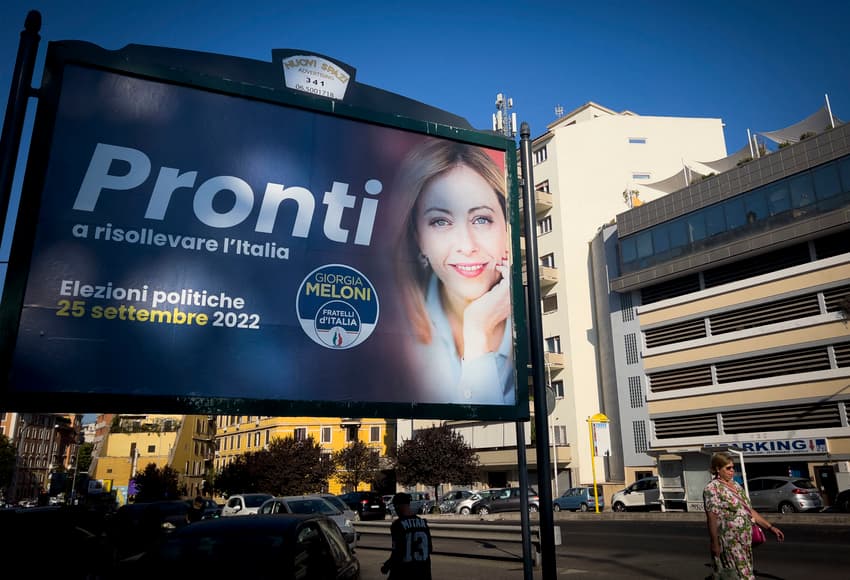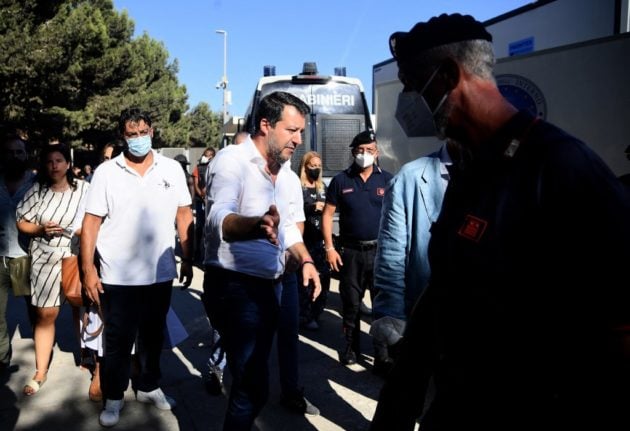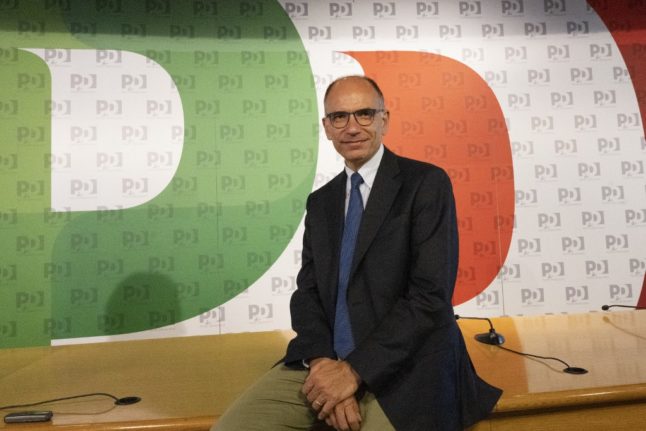Italian elections: What are the party policies that affect foreigners in Italy?

With Italy's September 25th general election fast approaching, we take a look at the main parties' key policies affecting foreign nationals.
The ‘centre-right’
The ‘centre-right’ or centrodestra is a three-party coalition led by the post-fascist Brothers of Italy, along with the hard-right populist League, led by Matteo Salvini, and Silvio Berlusconi’s conservative Forza Italia.
This alliance is expected to win by a landslide, together currently polling at around 48 percent.
READ ALSO: What election promises have Italy’s political parties made so far?
While referred to as the 'centre-right' in Italian media, the three main parties take a hard line on many issues - unsurprisingly including migration, which they frame as a question of national security.
Matteo Salvini, known for his strongly anti-immigration stance, is widely expected to take back his previous post of interior minister if the right-wing bloc takes power.
Salvini was Italy's interior minister between June 2018 and September 2019, during which time he passed a 'security decree' (often referred to as the 'Salvini Decree') that abolished the country's humanitarian protection status for migrants, made it easier to strip them of Italian citizenship, and prevented asylum seekers from accessing reception centres.
It also made applying for Italian citizenship a longer, more difficult and uncertain process.
READ ALSO: What you need to know about Italy’s language test for citizenship
This decree was overhauled and softened in 2020 with the passage of a new law by the coalition government then in power.
The right-wing bloc has indicated it intends to bring the decree back, with the coalition's immigration agenda in its election manifesto topped by a bullet point that simply reads "security decrees".

League leader Matteo Salvini (C) visits a migrant reception facility on the southern Italian island of Lampedusa on August 4th as part of his election campaign. Photo by Filippo MONTEFORTE / AFP
Other somewhat vague objectives include "combating irregular immigration and the orderly management of legal flows of immigration" and "promoting the inclusion of legal immigrants socially and in the workforce."
More specific measures the coalition has proposed are:
- Creating EU-managed 'hotspot' reception centres outside of Europe to process asylum applications.
- Enforcing checks on Italy's and Europe's borders "as requested by the EU's New Pact on Migration and Asylum" by blocking landings, and working with North African authorities to prevent people from leaving.
- Providing local authorities with the financial resources to take charge of unaccompanied minors.
While the policy doesn't appear anywhere in the coalition's manifesto, Brothers of Italy leader Giorgia Meloni has repeatedly said on her social media accounts she wants to set up a 'naval blockade' to "put an end to illegal departures to Italy".
The Democratic Party/centre-left
The centre-left Democratic Party (PD) are part of a similarly-aligned 'centrosinistra' or centre-left coalition that includes a large number of smaller parties, and is currently polling at just over 29 percent.
As things stand, the centre-left currently have no unified platform, so PD have published their own manifesto.
READ ALSO: Why does Italy have so many political parties?
The document stands in direct opposition to the right-wing bloc's stance on immigration.
It pointedly states: "We were, are and will always be against policies of 'refoulement'; illusory 'closures of our ports' or even unspecified 'naval blockades': the sacrosanct principle applies that those in danger at sea must always be rescued and saved."
It focuses mainly on the integration and reception of migrants and refugees.
Here are PD's key policy proposals:
- Establish a Migration Policy Coordination Agency to manage all aspects of immigration, including the reception of migrants and their integration into society and the workforce.
- Develop a new migrant reception model based on small residential centres spread throughout and integrated into the Italian territory.
- Replace Italy's 2002 'Bossi-Fini' decree - which, among other things, allows certain non-EU migrants to enter Italy only if they already have an employment contract and provides for the expulsion of people whose contracts have ended - with a new immigration law that allows people to legally migrate to Italy for work.
- Introduce Ius Scholae, which would allow children who arrived in Italy under the age of 12 and have completed five years of schooling in the country to apply for citizenship.
- Support the expansion of 'humanitarian corridors' to allow safe passage to Italy for refugees in particularly urgent situations.
- Push the EU to abolish the Dublin Regulation, which requires asylum seekers to remain in the first EU country they enter/are registered in, and replace it with "a true European policy on migration and reception."
READ ALSO: Elections: Italy’s Lampedusa residents ‘left behind’ by migration focus

Enrico Letta, head of the centre-left Democratic Party (PD), at an interview with AFP in Rome on July 29th, 2022. (Photo by Tiziana FABI / AFP)
The Five Star Movement (Movimento Cinque Stelle)
The populist Five Star Movement (M5S), running alone, is currently expected to take around 11 percent of the vote.
M5S's policies related to immigration and foreign nationals are fairly non-specific.
In its manifesto, the party says it's in favour of the "adoption of a community mechanism" at an EU level to manage migration and the reception of new arrivals, "as well as the subsequent reception allocation and distribution between different countries of the European Union".
READ ALSO: How many residence permits does Italy grant to non-EU nationals?
The party also says it intends to fight human trafficking and "strengthen social and cultural inclusion and integration policies."
Like PD, M5S would introduce Ius Scholae citizenship rights.
The third pole ('terzo polo')
An alliance between the centrist party Azione and Matteo Renzi’s Italia Viva, referred to as the ‘third pole’, is polling at around five percent.
The 'third pole' is unique in primarily framing immigration neither in terms of security nor human rights, but as an economic and labour market issue.
Italy has an ageing population, the coalition's manifesto points out, and the ratio of workers to pensioners is expected to fall from 3-2 to 1-1 by 2045.
On this basis, the parties say they want to promote regularised immigration to bolster the Italian economy, and in doing so combat 'irregular immigration'.
To achieve this, the alliance proposes:
- Establishing cooperation agreements with countries of origin on both a national and an EU level to agree on migration flows based on Italy's labour market needs.
- Distinguishing clearly between refugees and economic migrants, granting more visas for work based on employer sponsorship and fewer for humanitarian protection.
- Compulsory intensive Italian language and culture courses for new arrivals.
- The regularisation of undocumented migrants already living in Italy who have a job.
- The introduction of Ius Scholae plus granting citizenship to all foreign students who complete their university studies in Italy.
- Abolishing the Dublin Regulation and creating a Common European Asylum System that evenly distributes asylum seekers between EU Member States.
- Expanding 'humanitarian corridors' and guaranteeing and financing Europe-wide sea rescue efforts (the manifesto explicitly says the coalition rejects the right's proposal to process asylum applications outside Europe's borders).
- Establishing a Ministry for Immigration to deal with all aspects of immigration.
Find all the latest news on Italy’s election race here.
Comments (1)
See Also
The ‘centre-right’
The ‘centre-right’ or centrodestra is a three-party coalition led by the post-fascist Brothers of Italy, along with the hard-right populist League, led by Matteo Salvini, and Silvio Berlusconi’s conservative Forza Italia.
This alliance is expected to win by a landslide, together currently polling at around 48 percent.
READ ALSO: What election promises have Italy’s political parties made so far?
While referred to as the 'centre-right' in Italian media, the three main parties take a hard line on many issues - unsurprisingly including migration, which they frame as a question of national security.
Matteo Salvini, known for his strongly anti-immigration stance, is widely expected to take back his previous post of interior minister if the right-wing bloc takes power.
Salvini was Italy's interior minister between June 2018 and September 2019, during which time he passed a 'security decree' (often referred to as the 'Salvini Decree') that abolished the country's humanitarian protection status for migrants, made it easier to strip them of Italian citizenship, and prevented asylum seekers from accessing reception centres.
It also made applying for Italian citizenship a longer, more difficult and uncertain process.
READ ALSO: What you need to know about Italy’s language test for citizenship
This decree was overhauled and softened in 2020 with the passage of a new law by the coalition government then in power.
The right-wing bloc has indicated it intends to bring the decree back, with the coalition's immigration agenda in its election manifesto topped by a bullet point that simply reads "security decrees".

Other somewhat vague objectives include "combating irregular immigration and the orderly management of legal flows of immigration" and "promoting the inclusion of legal immigrants socially and in the workforce."
More specific measures the coalition has proposed are:
- Creating EU-managed 'hotspot' reception centres outside of Europe to process asylum applications.
- Enforcing checks on Italy's and Europe's borders "as requested by the EU's New Pact on Migration and Asylum" by blocking landings, and working with North African authorities to prevent people from leaving.
- Providing local authorities with the financial resources to take charge of unaccompanied minors.
While the policy doesn't appear anywhere in the coalition's manifesto, Brothers of Italy leader Giorgia Meloni has repeatedly said on her social media accounts she wants to set up a 'naval blockade' to "put an end to illegal departures to Italy".
The Democratic Party/centre-left
The centre-left Democratic Party (PD) are part of a similarly-aligned 'centrosinistra' or centre-left coalition that includes a large number of smaller parties, and is currently polling at just over 29 percent.
As things stand, the centre-left currently have no unified platform, so PD have published their own manifesto.
READ ALSO: Why does Italy have so many political parties?
The document stands in direct opposition to the right-wing bloc's stance on immigration.
It pointedly states: "We were, are and will always be against policies of 'refoulement'; illusory 'closures of our ports' or even unspecified 'naval blockades': the sacrosanct principle applies that those in danger at sea must always be rescued and saved."
It focuses mainly on the integration and reception of migrants and refugees.
Here are PD's key policy proposals:
- Establish a Migration Policy Coordination Agency to manage all aspects of immigration, including the reception of migrants and their integration into society and the workforce.
- Develop a new migrant reception model based on small residential centres spread throughout and integrated into the Italian territory.
- Replace Italy's 2002 'Bossi-Fini' decree - which, among other things, allows certain non-EU migrants to enter Italy only if they already have an employment contract and provides for the expulsion of people whose contracts have ended - with a new immigration law that allows people to legally migrate to Italy for work.
- Introduce Ius Scholae, which would allow children who arrived in Italy under the age of 12 and have completed five years of schooling in the country to apply for citizenship.
- Support the expansion of 'humanitarian corridors' to allow safe passage to Italy for refugees in particularly urgent situations.
- Push the EU to abolish the Dublin Regulation, which requires asylum seekers to remain in the first EU country they enter/are registered in, and replace it with "a true European policy on migration and reception."
READ ALSO: Elections: Italy’s Lampedusa residents ‘left behind’ by migration focus

The Five Star Movement (Movimento Cinque Stelle)
The populist Five Star Movement (M5S), running alone, is currently expected to take around 11 percent of the vote.
M5S's policies related to immigration and foreign nationals are fairly non-specific.
In its manifesto, the party says it's in favour of the "adoption of a community mechanism" at an EU level to manage migration and the reception of new arrivals, "as well as the subsequent reception allocation and distribution between different countries of the European Union".
READ ALSO: How many residence permits does Italy grant to non-EU nationals?
The party also says it intends to fight human trafficking and "strengthen social and cultural inclusion and integration policies."
Like PD, M5S would introduce Ius Scholae citizenship rights.
The third pole ('terzo polo')
An alliance between the centrist party Azione and Matteo Renzi’s Italia Viva, referred to as the ‘third pole’, is polling at around five percent.
The 'third pole' is unique in primarily framing immigration neither in terms of security nor human rights, but as an economic and labour market issue.
Italy has an ageing population, the coalition's manifesto points out, and the ratio of workers to pensioners is expected to fall from 3-2 to 1-1 by 2045.
On this basis, the parties say they want to promote regularised immigration to bolster the Italian economy, and in doing so combat 'irregular immigration'.
To achieve this, the alliance proposes:
- Establishing cooperation agreements with countries of origin on both a national and an EU level to agree on migration flows based on Italy's labour market needs.
- Distinguishing clearly between refugees and economic migrants, granting more visas for work based on employer sponsorship and fewer for humanitarian protection.
- Compulsory intensive Italian language and culture courses for new arrivals.
- The regularisation of undocumented migrants already living in Italy who have a job.
- The introduction of Ius Scholae plus granting citizenship to all foreign students who complete their university studies in Italy.
- Abolishing the Dublin Regulation and creating a Common European Asylum System that evenly distributes asylum seekers between EU Member States.
- Expanding 'humanitarian corridors' and guaranteeing and financing Europe-wide sea rescue efforts (the manifesto explicitly says the coalition rejects the right's proposal to process asylum applications outside Europe's borders).
- Establishing a Ministry for Immigration to deal with all aspects of immigration.
Find all the latest news on Italy’s election race here.
Join the conversation in our comments section below. Share your own views and experience and if you have a question or suggestion for our journalists then email us at [email protected].
Please keep comments civil, constructive and on topic – and make sure to read our terms of use before getting involved.
Please log in here to leave a comment.